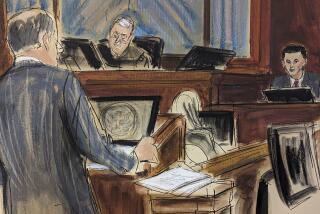Heir Happy With Life as Canadian Banker : Edgar F. Kaiser Jr. Doesn’t Regret Leaving Firm
- Share via
Edgar F. Kaiser Jr. leaned forward in his chair and asked questions that have dogged him for most of his adult life: “How can you be the heir apparent to an idea? How do you do that?”
Kaiser is the 44-year-old grandson of Henry J. Kaiser, the eldest son of Edgar Fosburgh Kaiser Sr., and the one-time heir apparent to the Kaiser industrial empire. The breeding shows in subtle ways, such as the fine, understated cut of his clothes, and in obvious ones, such as the wide, easy Kaiser smile. This is the Kaiser who was reared, educated and groomed for life at the top of the corporate ladder.
But by the time he became chairman of Kaiser Steel--the last Kaiser to run a Kaiser company--the family’s hold on the industrial empire had been relinquished. He walked away from the steel company in 1981, to return to Canada and his own ideas. And every time someone asks him to look back, he balks.
He’s a banker now, and likes it that way. “I think perhaps it’s the best job I’ve ever had,” he said. And the smile switches back on as he leans back to talk about what being chairman of Bank of British Columbia means to him, and how great it is to be living in Vancouver, away from the smog that is visible through the window of his Century Plaza suite.
Last Name Helped
Not all is forgotten, by any means. “I think all the experiences that my last name has afforded me have helped in running the bank, no question of that.”
For one thing, he learned how to bring a little color back to a profit-drained balance sheet. When he arrived at the bank last fall, it was in trouble. So he got it a new infusion of capital and expanded it into new areas, reducing its dependency on small, or retail, accounts.
And the small bank--$3.5 billion in assets--is now playing with the big boys, such as Sam Belzberg. Not only is Belzberg, the Canadian industrialist, an investor in the bank, but he is a neighbor and friend, Kaiser said. When Kaiser joined Belzberg in offering a line of credit to T. Boone Pickens Jr.’s unsuccessful attempt to take over Unocal earlier this year, the bank made almost $1 million in fees.
The bank is looking healthier, but it’s not fixed yet. It may take another year or more, Kaiser said.
Kaiser likes to think of himself as a sort of Mr. Fix-It for troubled small companies. It was a pattern that began in 1970 when his father asked him to leave Washington, where Edgar Jr. had been a White House fellow, to participate in the overhaul of Kaiser Resources. At that time, Resources was the ailing Canadian coal mining subsidiary of Kaiser Steel.
In a few years, Kaiser was the chief executive and Kaiser Resources was highly profitable. But the steel company was in trouble.
Tough Assignment
In 1979, his father asked him to go to Kaiser Steel. “We were both in tears. I knew what it meant. Nobody else saw it, but I knew what I had to do.” Raising money for Kaiser Steel meant selling Kaiser Resources.
And he had to “break up a lot of Steel. I sold off a lot of divisions of Steel. My first day on the job was the prodigal son returning. I had to go out after 30% of the work force at Fontana . . . it sure wasn’t fun.”
He would have done more things, shut down most of the Fontana mill, maybe, or gone into a joint venture with low-cost Japanese steel makers, sold off other assets. But he was stymied. “It was the worst year and a half of my life.”
He never got an opportunity to try his hand at fixing Kaiser Industries, the holding company that was liquidated in 1977. He said he never really wanted to anyway, that he had no inclination to live in the Bay Area and work at the Kaiser Center, the Oakland headquarters for the Kaiser operating companies.
“I don’t think it was Kaiser Center which motivated my grandfather. . . . It was whatever the project was that interested him and I think I’m probably more along those lines: It’s whatever needs to be done--what you’re doing--that’s important. . . . The fun of building the Kaiser companies was the fun that my grandfather and the men that worked with him had. And my life’s ambition was not to try to somehow achieve the top of administering what they had had fun building.”
It was other people, he says, who called him the heir apparent to Kaiser Industries. He didn’t see it that way. What Kaiser was about, he says, was running with a crazy idea “that led to a whole series of other things. . . . It wasn’t about Kaiser Center, it was about ideas.”
More to Read
Inside the business of entertainment
The Wide Shot brings you news, analysis and insights on everything from streaming wars to production — and what it all means for the future.
You may occasionally receive promotional content from the Los Angeles Times.










